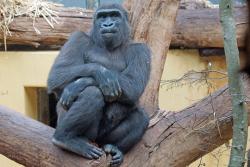Lockdown challenges β what evolution tells us about our need for personal space
![]() This article by Vivien Shaw of the School of Medical Sciences and Isabelle Winder of the School of Natural Sciences is republished from under a Creative Commons license. Read the .
This article by Vivien Shaw of the School of Medical Sciences and Isabelle Winder of the School of Natural Sciences is republished from under a Creative Commons license. Read the .
Humans are intensely social creatures. We all need company and social contact. But for many of us, being at home for long periods with a small group of people β even those we love best β can become frustrating.
One key to understanding why constant contact with our family feels so unusual comes from looking at how social groups work in other primate species.
 A gorilla seeks space at a zooNormally, a primateβs interaction with others is very well balanced. Neither our ancestors before Homo sapiens nor our close relatives like chimpanzees and bonobos . Instead, their natural social groups are flexible, which gives them the space and time to change their interactions over short time periods.
A gorilla seeks space at a zooNormally, a primateβs interaction with others is very well balanced. Neither our ancestors before Homo sapiens nor our close relatives like chimpanzees and bonobos . Instead, their natural social groups are flexible, which gives them the space and time to change their interactions over short time periods.
These kinds of group, which are more complex than those of many mammals, are called or ββ societies. They consist of an overarching group that splits up and then comes back together on an hourly, daily, or weekly basis.
Subgroups can vary in composition, with individuals coming and going. The distance that they travel away from one another can vary, as does the length of time subgroups stay together. Some, like mother-offspring groups, can last for years. Others are and reflect rapidly shifting alliances, fallings out and friendships.
This is similar to human friendship groups, some of which last for lifetimes and others for only the brief duration of a holiday.
Space to breathe
Zoos need to understand the importance of providing animals in captivity with appropriate social environments for them to thrive in. In monkeys and apes, disturbed behaviour patterns resulting in psychotic behaviour have been a topic of research for . From this, it seems clear that the need for personal space and a desire to have control over the intensity and frequency of our contact with our families is not exclusive to humans.
Living in social groups is a for primates and is one of the reasons why itβs so difficult to provide great apes with good homes in captivity.
Modern humans, meanwhile, often have the freedom to split their homes into multiple rooms and use other spaces for work and leisure. This helps us (under normal circumstances) to have a mixture of privacy, companionship and family time. In lockdown of course, we have much less freedom. Social relationships that are normally maintained through a combination of intense interaction and periods of separation β while children attend school and adults go to work β now exist in close, long-term proximity.
Humans also have the most flexible and variable social networks of any primate species. Our social groups of roughly 150 individuals include βcirclesβ of successively closer people. And unlike chimpanzees, we have .
A human social network is not a clear cut unit where any individual is either in or out. Instead, the boundaries are fluid, and at the edges new people come in as others leave. Bonobos have a .
Each of our social networks also overlaps to differing degrees with others. A friend who is definitely part of my network will have their own network that overlaps with mine to a greater degree than a distant acquaintance.
For human hunter-gatherers, this sort of network structure β with close ties and distant ones, and non-overlapping connections among members of the same tribe β is vital to survival. At times of extreme stress, like a serious drought, having one or two contacts a long way away gives you somewhere to go .
A home group may fission (split) for a season, with each family heading off to their distant friends, and come back together when conditions improve. The group can do this without losing their overall identity. This can also help at times of social conflict, allowing much needed time to cool off.
 Listening to music on headphones can create 'virtual' space during the current 'lockdown'.In essence, while we have evolved to be very sociable, we are nevertheless accustomed (culturally and evolutionarily) to flexible social networks that give us personal space to manage our lives and relationships. Both isolation and too much enforced proximity to the same people can be detrimental to our mental health.
Listening to music on headphones can create 'virtual' space during the current 'lockdown'.In essence, while we have evolved to be very sociable, we are nevertheless accustomed (culturally and evolutionarily) to flexible social networks that give us personal space to manage our lives and relationships. Both isolation and too much enforced proximity to the same people can be detrimental to our mental health.
There is hope, however. Humans are resilient creatures who will find strategies to achieve some sense of personal space during lockdown, whether itβs through modern technology or a simple solitary stroll.
Negotiating ways for each individual in a household to control their natural need for personal space, at least some of the time, is key. Knowing that your personal time will be respected can help to ease the strain of enforced sociability.![]()
Publication date: 4 May 2020
